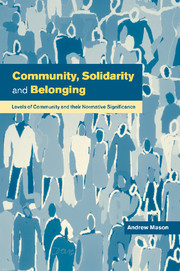Book contents
- Frontmatter
- Contents
- Acknowledgements
- Introduction
- Part 1 Community and its value
- Part 2 Political community in a culturally diverse society
- 3 Liberal political community and illiberal minorities
- 4 Republican political community
- 5 National community: the benefits of a sense of belonging together
- 6 Multicultural education for an inclusive political community
- Part 3 Political community and the limits of global community
- Conclusion
- Bibliography
- Index
6 - Multicultural education for an inclusive political community
Published online by Cambridge University Press: 22 September 2009
- Frontmatter
- Contents
- Acknowledgements
- Introduction
- Part 1 Community and its value
- Part 2 Political community in a culturally diverse society
- 3 Liberal political community and illiberal minorities
- 4 Republican political community
- 5 National community: the benefits of a sense of belonging together
- 6 Multicultural education for an inclusive political community
- Part 3 Political community and the limits of global community
- Conclusion
- Bibliography
- Index
Summary
It might be thought that the kinds of legal and political recognition defended at the end of the previous chapter are unlikely to be sufficient to foster the widespread sense of belonging which an inclusive political community requires. For there to be such a sense of belonging, citizens must identify with at least most of their major institutions and some of their central practices, and feel at home in them. But it is possible for a person to identify with a practice only if she finds it valuable. In so far as the political, legal, educational, artistic and other central practices of a society reflect mainly the concerns and interests of the dominant community, this will make it harder for members of minority cultural communities to identify with them and feel at home in them.
Identification with these practices could be facilitated by two kinds of change. First, by members of the dominant cultural community coming to value the influence of traditions which are part of other cultures, with the result that the practices are transformed. Second, by members of minority cultures coming to value the traditions which inform society's practices as they stand currently. This line of thought leads naturally to the conclusion that the major institutions should not merely acknowledge in various ways the importance of cultural communities to their own members but also foster the mutual valuing of cultures.
- Type
- Chapter
- Information
- Community, Solidarity and BelongingLevels of Community and their Normative Significance, pp. 148 - 170Publisher: Cambridge University PressPrint publication year: 2000



